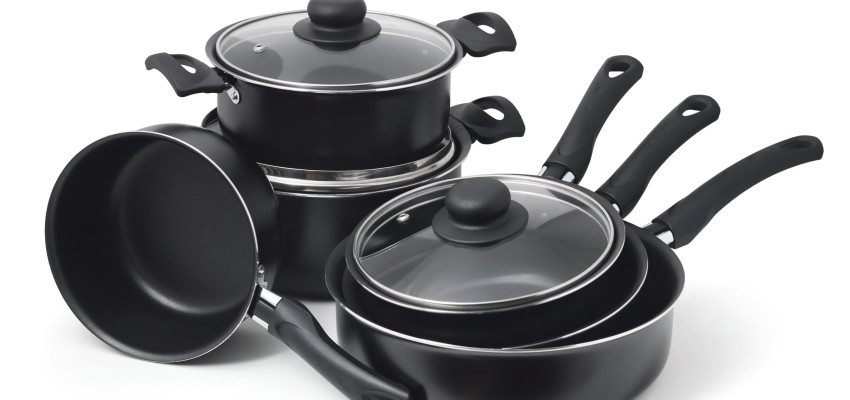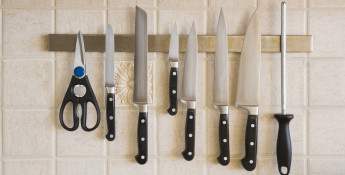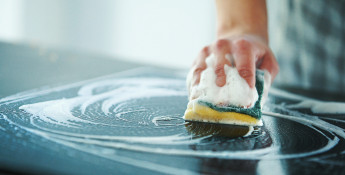By Chef Alli on October 23, 2023
Caring for nonstick cookware

Guarding the slick finish on your nonstick cookware is important to keep it in good working order so it lasts.
Below are some essential tips that make cooking and cleaning quicker and easier, without causing damage to that delicate nonstick surface.
Ditch metal utensils for nonstick
Do not use metal utensils or wooden spoons since they can easily damage nonstick coating.
Instead, prevent scratches and dings by using nylon, rubber or silicone spoonulas, spatulas and whisks when cooking in nonstick cookware.
Wash by hand
If you find yourself wondering why your favorite nonstick skillet suddenly isn’t nonstick, your automatic dishwasher could be the culprit.
Even if your nonstick pans are labeled as dishwasher safe, extreme heat, water pressure and detergent can corrode a nonstick finish.
Wash nonstick cookware by hand using warm soapy water and very soft dish cloths. Never use steel wool, scouring pads or stiff brushes.
You can tackle messier pans by creating a paste of baking soda and water. Apply by hand using a soft sponge or cloth.
No nonstick spray
It sounds counterintuitive, but nonstick cooking sprays can cause foods to stick like crazy.
Aerosol nonstick sprays tend to build up and harden on nonstick surfaces, creating a residue layer that is nearly impossible to remove.
This residue is easy to spot — its caramel color stain is often seen on nonstick cookware that has baked on over time.
Instead of nonstick sprays, add butter or oil directly to the bottom of your nonstick pans when cooking. As soon as the oil is hot, add the food directly to the pan.
Preheat safely
Preheating a dry (empty) nonstick pan on a burner is never a good idea since it can cause the release of harmful chemicals.
Instead, add oil, liquid or food to the nonstick pan before you bring on the heat, especially when higher temperatures are involved.
Cool it
Nonstick cookware isn’t meant to be used over super high heat since this can damage the nonstick finish and potentially release harmful chemicals into the foods you are cooking.
Cooking over low or medium heat helps nonstick finishes last longer.
No leftovers
Food stored in nonstick cookware can quickly take on a metallic taste.
As soon as the leftover food has cooled, remove it from the nonstick skillet or pan and place it into food storage containers made for the fridge.
Keep it steady
Quick and drastic temperature changes, such as moving a pan from a high heat burner to running it beneath a stream of cold water can warp nonstick cookware. Warped cookware prevents heat from being distributed evenly, creating hot spots that cause food to burn.
Allow the pan or skillet to cool off for a few minutes before rinsing or washing, then proceed.
Say no to soaking
Instead of soaking nonstick cookware for long periods of time (which can damage the finish), wash your pans within an hour or two of using them. Be sure to dry thoroughly before storing.
Highly acidic foods
Preparing large amounts of acidic foods in nonstick cookware can quickly wear down the finish and promote flaking.
It’s fine to add a splash of lemon juice or vinegar, but for cooking tomato-based sauces, switch over to your stainless-steel pans instead.
Storing your cookware
Stacking nonstick cookware together or with other types of pots and pans can easily cause scratches and pitting in the finish.
Instead, hang them from a storage rack that is easily accessible or stack them safely by placing paper towels or paper plates in between the pans to act as a buffer.
Plan for retirement
The average life span for nonstick cookware is about five years, depending on how much and how hard they are used.
It’s important to know when to retire your nonstick pots and pans since damage over time can expose food to potentially toxic PFAs (Per and Polyfluoroalkyl Substances) used in the finish.
If you notice any of your pans are knocked, scratched, peeling or pitted, it’s time to invest in a new set of nonstick cookware.





